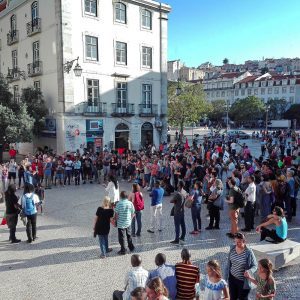Our Editor-at-Large (Europe), Amit, experienced human rights abuse, such as racial discrimination, in Portugal. An exclusive for Different Truths.
Portugal as a European Union member state – like other Western nations – claims and boast to promote, protect and respect human rights – at least in principle. Amazingly, what intrigued me is that some Portuguese institutions such, public university and immigration offices, particularly SEF (Foreigners and Borders Service – a ministry of the government) are deeply plagued by some worst kinds of human rights abuses, such as racial discrimination.
Portugal’s “age of discovery” taught in schools creates a misguided sense of pride in colonialism[1]. There is no space for public discussion regarding institutional racism.

In general, Portuguese society, at least superficially, seems nostalgic about its colonial past; Portugal’s “age of discovery” taught in schools creates a misguided sense of pride in colonialism[2]. There is no space for public discussion regarding institutional racism (Cristina Roldão)[3].
Surprisingly, in Portugal, it is illegal to collect data regarding the population’s ethnicity or race, so there are no official numbers about the black population in Portugal. Regardless of the challenges in collecting the data, there are alarming signs of institutional racism[4]; media news and reports by union members point to the existence of some discrimination in the labour market (RAXEN 3 report)[5].
It’s a hard fact that, institutional discrimination is deeply entrenched in the employment agency, the social insurance office, the health care services, the police, and particularly in the border and foreigners service.
Prima facie, it is similar to ‘do not ask do not tell’ policy, which is pushed underground to hide the racial debate – without allowing it to be discussed, in public, as racism no longer exits. Although it’s a hard fact that, institutional discrimination is deeply entrenched in the employment agency, the social insurance office, the health care services, the police, and particularly in the border and foreigners service (hereafter SEF) (Santos, Kumar, Brigaderio, Olive, 2008).
Lived Experience of Racial Discrimination
For those, like me, coming from a non-western country (India) without a scholarship, life is tough, and the future, uncertain.
Being an international student in Portugal studying at the University of Coimbra (UC) could be an experience of a lifetime. For those, like me, coming from a non-western country (India) without a scholarship, life is tough, and the future, uncertain. I am a PhD student at the Centre for Social Studies, University of Coimbra.
Visa Hurdles
The ordeal for an international student starts when (s)he applies for a student visa from a non-western country. Visa process is painfully long and uncertain. It took four months to get my visa approved by the Portuguese Embassy in India, but only when my course coordinator wrote a letter to the embassy. However, in this process, I have lost my precious time, missed many classes and orientation program at the University.
According to a study published in the Journal of International Students (2017), main hindrances accessing higher education in Portugal that an international student faces is obtaining their visas due to bureaucratic hurdles.

According to a study published in the Journal of International Students (2017), main hindrances accessing higher education in Portugal that an international student faces is obtaining their visas due to bureaucratic hurdles. These visa issues have serious repercussion in academic and social life, since they define when a student arrives at the Portuguese Universities; due to delayed visa process student particularly from Portuguese speaking African countries, mostly arrive in the middle of the first semester, which deeply affects their academic and social adjustment. Visa delay and rejection is not just a bureaucratic issue (particularly related to serious students) but embedded in a racist discourse. It is to be noted that visa rules (including non-western countries) officially discriminate a person of the basis of the country of their origin, privileging western over the non-western person.
A renewing student residence permit is another big hurdle. First, it’s not easy to get an appointment with SEF on the desired time, second, cumbersome paperwork and lack of information on SEF website, makes this process uncertain and expansive. Example, in order to get my residence, permit renewed I had to travel Guarda from Coimbra (104Km), even though I have applied three months in advance. Thus, this process costs time and money. This process hurts especially when one is not on scholarship and struggling to pay tuition fees, boarding, and lodging expenses. There are thousands of students and migrants like me who are forced to go through this agony.
Issue of renewing student permit has a simple solution. Like, in the US, for a student visa, SEF can issue a student visa for the entire duration of the study. For example, a PhD. student shall get his/her visa for four years or two years for a master’s student. For those who are pursuing higher education in Portugal, this simple measure could make an international student’s life a bit easier, less stressful and more productive.
Students from some countries (such as Brazil, Mexico, the USA, etc) are issued student permits for two years, whereas Indian students are issued a resident permit only for a year.
In response to this, those who make counter argument believe that renewing visa, annually, helps in monitoring the student’s academic progress. However, this argument does not hold ground keeping the fact that students from some countries (such as Brazil, Mexico, the USA, etc) are issued student permits for two years, whereas Indian students are issued a resident permit only for a year. My student’s residence permit (a doctorate student) was renewed for one year, whereas my classmates (Brazilian, Mexican, American) student’s permit for two years. This is racism pure and simple – no one talks about this – not even leftist students in the university campus.
Scholarship Hindrance
Another problem concerns FCT (The Foundation for Science and Technology) scholarship guidelines, which requires an international applicant to apply for recognition or equivalency of their degree. However, to get their foreign degrees recognised in Portugal on time is a daunting and expensive task. I was selected for FCT scholarship meant for PhD. students in Human Rights at the Centre for Social Studies. However, my Indian bachelor’s degree was not recognised by Portuguese university. Thus, I was denied the scholarship. Interesting fact is that, I, however, can pursue PhD. on the basis of my bachelor and master’s degrees (which means my academic degree is recognised in University of Coimbra – a public university), but I am not eligible for FCT scholarship, which is a government agency. Two different rules for one academic degree effectively discriminates against a genuine student.
If the real purpose of the scholarship is to help student, then why not simplify the scholarship rules rather than complicate it.
If the real purpose of the scholarship is to help student, then why not simplify the scholarship rules rather than complicate it – until and unless the purpose is to filter out certain nationalities.
There shall not be a requirement for recognition or equivalency for one’s academic credential, since a genuine applicant is already pursuing his master’s or doctorate degree – this automatically confirms the credibility of his/her qualifications.
Linguistic Hurdles
The University of Coimbra claims to be an international university, however, I find its cultural space is not international. It is limited to Portuguese language speakers (including Brazilian), thus effectively excluding other major language speakers from participating in social-cultural life of University. I think, the cultural accommodation of students is a vital factor of any world-class institution.
There should be special cultural programs for English and Chinese speakers in their languages, since there are many students who do not understand Portuguese.
Thus, there should be special cultural programs for English and Chinese speakers in their languages, since there are many students who do not understand

Portuguese. Another linguistic suggestion is official announcements area made either through email or other media platform, should include an English translation – if not Chinese. Yet another step could be providing a simultaneous English translation in major academic seminars, which are usually conducted in Portuguese. In addition, officials working in university academic services department should be trained in working English, since most of them have to deal with international students and language is a major hurdle in dealing with non-Portuguese students.
Some of the issues discussed above may not concern directedly to racial discrimination, however, invisible and multiple discrimination is implicit and hidden within the Portuguese institutions, whether educational or related to immigration. Practice of racial discrimination socially, economically and politically exclude a foreign student (also immigrants, refugees). Thus, in reality, the claim to protect and respect human rights by Portugal does not hold ground. The proof of the pudding is in eating it!
Reference
Santos, T., Kumar, R., Brigaderio, E. (2008) Research survey on migrants’ experiences of racism and discrimination in Portugal, available at https://www.academia.edu/2519385/Research_survey_on_migrants_experiences_of_racism_and_discrimination_in_Portugal
Editor’s Note: This article is based on the author’s observation and experience as a doctorate student at the University of Coimbra. in Portugal. The views are strictly his, not that of Different Truths, or any of its staffers.
Photos from the Internet
[1] https://www.bbc.com/news/world-europe-44965631
[2] https://www.bbc.com/news/world-europe-44965631
[3] https://www.elmmagazine.eu/articles/black-students-in-portugal-struggle-with-institutional-racism/
[4] https://www.elmmagazine.eu/articles/black-students-in-portugal-struggle-with-institutional-racism/
[5] https://fra.europa.eu/sites/default/files/fra_uploads/238-PT.pdf





 By
By

 By
By
 By
By